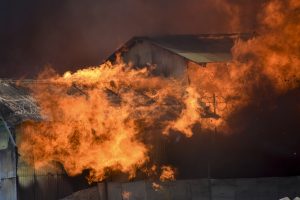The Pacific Island nation of Solomon Islands has been rocked by days of violent protests, with dozens of buildings, including a building at Parliament House and a major police station, burned down.
The protests began on Wednesday, when hundreds of protestors marched on the parliamentary precinct in the capital Honiara, demanding the prime minister resign over his decision to switch diplomatic allegiance from Taiwan to China in 2019.
Many of the protestors were from Malaita province — the most populous province in the country — which opposed the switch and has maintained relations with Taiwan, causing a major spat between the Malaita Premier Daniel Suidani and Prime Minister Manasseh Sogavare.
Despite a 36-hour lockdown imposed in Honiara, protestors continued to take to the streets, where they have been met by police using tear gas and rubber bullets.
Suidani told the Guardian that the protests had happened as a result of the government not listening to the people or engaging with their concerns on a range of issues, including infrastructure projects and the China-Taiwan switch.
“In my view, whatever the government wants the people to know, they must stand and tell them. They cannot run away from problems. It will not solve anything,” he said.
Sogavare dismissed the grievances held about his government in an interview with the Australian Broadcasting Corporation and said the protests are strictly because of the diplomatic switch.
“I feel sorry for my people in Malaita because they are fed with false and deliberate lies about the switch. That’s the only issue, the only issue, and unfortunately, it is influence and encouraged by other powers,” he said.
“These very countries that are now influencing Malaita are the countries that don’t want ties with the People’s Republic of China, and they are discouraging Solomon Islands to enter into diplomatic relations and to comply with international law and the United Nations resolution.”
“I don’t want to name names, we’ll leave it there, we know who they are,” he said.
In a statement published Thursday night by the Solomon Times newspaper, Sogavare defied calls for his resignation.
“The call for me to step down is premised on the hunger for power by certain politicians who do not have any respect for the principles of democracy and due process,” Sogavare said.
Matthew Wale, leader of the Solomon Islands opposition, has called on Sogavare to resign.
“Given the current situation, the honourable thing to do is to resign,” he said. “If Prime Minister Sogavare refuses to resign, I am calling on Ministers and MPs to resign from the DCGA to remove the Prime Minister,” he said in a statement. “Regrettably, frustrations and pent up anger of the people against the Prime Minister are spilling uncontrollably over onto the streets, where opportunists have taken advantage of the already serious and deteriorating situation”.
In response to the unrest, Australian Prime Minister Scott Morrison announced Thursday that more than 100 police and defense force personnel had been deployed to the Solomon Islands at the request of the Solomon Islands government.
“Our purpose here is to provide stability and security to enable the normal constitutional processes within the Solomon Islands to be able to deal with various issues that have arisen and that be done in a climate of peace, stability and security,” Morrison told reporters.
“It is not the Australian government’s intention in any way to intervene in the internal affairs of the Solomon Islands – that is for them to resolve. I’ve made that very clear,” he said.

































